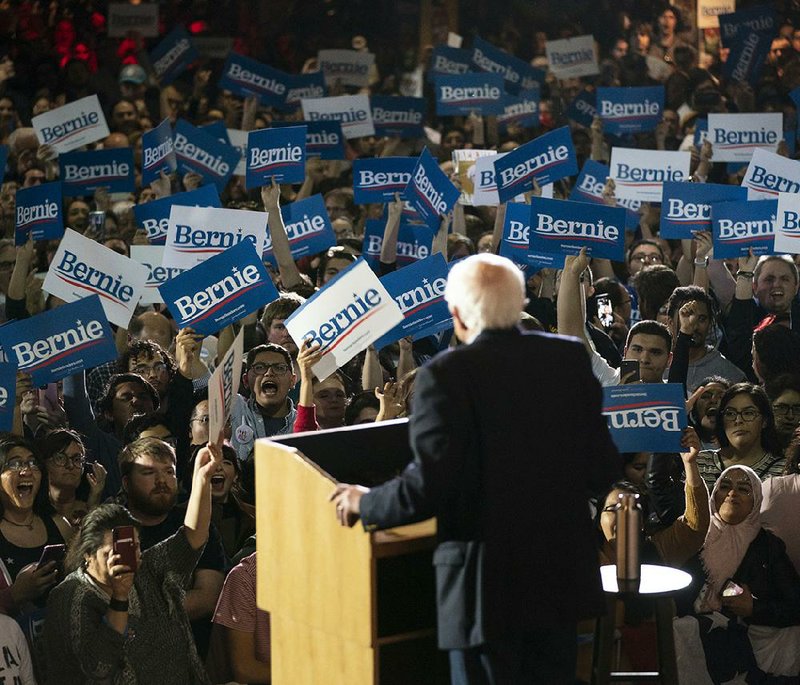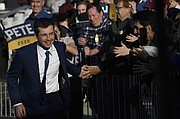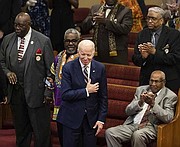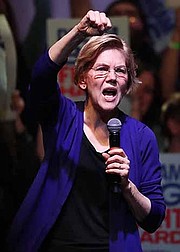WASHINGTON -- Bernie Sanders' victory Saturday in the Nevada caucuses made him a top target for his Democratic rivals and a growing source of anxiety for establishment Democrats worried that the nomination of an avowed democratic socialist could cost the party in November.
Sanders has now won in two of the three caucuses or primaries contested so far. The Democratic field now turns to Saturday's primary in South Carolina, where moderates will try to blunt the senator's momentum. But with so-called Super Tuesday just three days later -- when 14 states, including Arkansas, vote and one-third of the delegates are awarded -- time was running short for Sanders' opponents to consolidate support.
That prospect on Sunday amplified concerns among Democrats who believe Sanders' call for a political "revolution" would drive moderate and independent voters away from the party, both in the matchup against President Donald Trump and in House and Senate races.
"I think it would be a real burden for us in these states or congressional districts that we have to do well in," Rep. Jim Clyburn of South Carolina, the House majority whip and the top-ranking black Democrat in Congress, said Sunday on ABC's This Week.
Clyburn, who said he'll endorse a candidate on Wednesday, specifically pointed to the districts Democrats flipped to take control of the House in 2018. "In those districts, it's going to be tough to hold on to these jobs if you have to make the case for accepting a self-proclaimed democratic socialist," he said.
Sanders' campaign argued he will bring in new and infrequent voters -- largely progressives, young people and voters of color -- who have been alienated from the process and seek a drastic overhaul of Washington, not merely trying to oust Trump.
He successfully relied on that coalition Saturday to defeat his Democratic rivals in Nevada, pulling far ahead of the second-place finisher, former Vice President Joe Biden, and Pete Buttigieg, the former mayor of South Bend, Ind., who came in third. Massachusetts Sen. Elizabeth Warren landed in fourth, while Sen. Amy Klobuchar of Minnesota and Tom Steyer were in a close race for fifth as the Nevada Democratic Party continued to tabulate results.
Sanders celebrated the win in Texas, a top Super Tuesday prize and a state that Democrats see trending their way thanks to a growing Hispanic population and opposition to Trump in the suburbs.
[Gallery not loading above? Click here for more photos » arkansasonline.com/224campaign/]
"In Nevada we have just put together a multigenerational, multiracial coalition which is not going to only win in Nevada, it's going to sweep this country," he said to cheers in San Antonio.
Sounding like a candidate who had already secured the nomination, Sanders told thousands of cheering supporters who filled a basketball arena on the campus of the University of Houston that he would win in the state both next month and next fall.
"If working people and young people of this city, black and white and Latino, gay or straight, if our people stand together, come out to vote, we're going to win here in Texas," he said.
Sanders was announcing a plan to provide universal, government-funded child care until age 3 and universal pre-kindergarten programs after that. In an interview with 60 Minutes that aired Sunday night, he said he'd pay for it using part of the proceeds from his previously announced wealth tax, which would be levied annually on fortunes worth more than $32 million.
RIVALS TAKE AIM
Sanders' new status was clear as most of his rivals sharpened their focus on him.
On Sunday, Buttigieg ripped Sanders for his large and often combative online following, saying the nominee's job "is to call people into our tent, not to call them names online.
Speaking to a crowd of thousands gathered at a high school football field in Arlington, Va., Buttigieg said Democrats should nominate someone who will focus on "mobilizing, not polarizing the American majority."
"Politics will be fierce sometimes, but it is not just combat," he said.
Biden, meanwhile, swiped indirectly at Sanders, noting Sanders is an independent and not a member of the party he's seeking to represent in November, and at billionaire candidate Mike Bloomberg.
"I ain't a socialist. I'm not a plutocrat. I'm a Democrat," Biden told supporters Saturday.
But some Democrats were worried that the new focus on Sanders may be too little, too late. For months, as several Democrats jockeyed to become the chief alternative to Sanders, they largely attacked one another on debate stages and in ads while taking relatively few punches at the Vermont senator.
Indeed, even after Sanders' strong finish in Nevada, Warren avoided launching a direct hit at Sanders even when asked directly whether a Sanders nomination would be a risk for the Democratic Party. The Massachusetts senator is aligned with Sanders on a number of key policies and competing with the Vermont senator for many of the same progressive voters.
Speaking to reporters in Denver, Warren instead continued her attacks on Bloomberg, calling him the "riskiest candidate standing on that stage because of his history of hiding his taxes, his history of harassment of women and his history of defending racist policies."
"I think I'm the least risky candidate," she added, citing her progressive values and record of results.
One woman in the audience at a Denver event asked Warren to explain the benefits of democratic socialism. Warren said: "you've got the wrong candidate." Warren said she was not a socialist. "I believe in markets," she said, adding quickly "markets without rules are theft."
And party leaders have been reluctant to appear to be putting their thumb on the scale, so as not to rile Sanders voters and further divide the party. It was not clear Sunday that there was any new strategy to try to knock Sanders off course or consolidate support behind a single moderate.
"We've got to hope that some of these candidates develop political skills quickly," said James Carville, a Democratic strategist. "The risk in losing the election is deep and profound. We've just got to pray."
SUPER TUESDAY'S PRIZE
The candidates already are campaigning in the 14 states that vote on Super Tuesday, when 1,357 delegates are at stake, 415 from California alone. Buttigieg and Bloomberg already have issued "state of the race" memos warning that Sanders could earn an insurmountable cache of delegates on that day. Polls show he leads in California.
Sanders has consumed much of the progressive support that Warren enjoyed early in the race, but the centrist votes are still split among Biden, Bloomberg, Buttigieg and Klobuchar. That, too, has enabled Sanders' rise.
Dan Pfeiffer, a former adviser to President Barack Obama, said if no candidates drop out before Super Tuesday and the moderates continue to split the delegates, Sanders likely has a lock on the nomination.
"It's just simple math," Pfeiffer said, noting that he's not advocating that any candidates drop out to stop Sanders, and that he doesn't ascribe to the belief among some Democrats that Sanders can't win.
"Each of these campaigns have a legitimate rationale for staying in the race," he said of Sanders' opponents.
Bloomberg has made a direct appeal for moderates to coalesce around one candidate -- preferably him. But his poor performance at last week's debate undercut his claim to be the one to stop Sanders with his huge war chest, which has spent close to a half-billion dollars on advertising alone.
"The Nevada results reinforce the reality that this fragmented field is putting Bernie Sanders on pace to amass an insurmountable delegate lead," Bloomberg campaign manager Kevin Sheekey said in a statement after the Nevada race was called. "If we choose a candidate who appeals to a small base -- like Sen. Sanders -- it will be a fatal blow."
On Sunday, those Sanders opponents pledged to stay in the race through South Carolina, and several signaled they would stay in through Super Tuesday.
Klobuchar rallied supporters near the North Dakota-Minnesota border, speaking to voters in her home state, which votes on March 3, while North Dakota is on March 10. Warren campaigned in Colorado, also a Super Tuesday state. Biden was in South Carolina, the state his campaign hopes will revive his candidacy after poor showings in Iowa and New Hampshire and only modest improvement in Nevada.
Biden resisted predicting victory in South Carolina and said he isn't banking on Clyburn's endorsement, a blessing that could help Biden shore up support with the black voters his campaign has long argued will be the springboard to a nomination. Clyburn said Sunday he had heard from Democrats disappointed in Biden's debate performances.
Democrats will debate on Tuesday in Charleston, S.C. California billionaire Tom Steyer said Sunday he has qualified for that debate, after missing the mark for the stage in Nevada.
The stakes were high for Nevada Democrats to avoid a repeat of the chaos in the still-unresolved Iowa caucuses, and it appeared they did not entirely avoid complaints. Buttigieg's campaign raised questions about the results, citing more than 200 reports of problems allocating votes. It wants the state party to disclose more details of the votes and address concerns before releasing final results.
But the party said it was not planning to offer a more detailed voting breakdown and appeared to be inviting the campaign to follow recount rules if it wanted to challenge the results.
With 60% of precincts reporting, Sanders had 46% to Biden's 19.6% of the county delegates. Buttigieg was in third with 15.3%, the threshold used to award delegates to the nominating Democratic National Convention.
At stake in Nevada were 36 pledged delegates to the national convention of the 1,991 needed to secure the party's nomination. The results could give Sanders a narrow delegate lead over Buttigieg, with just 2.5% of delegates awarded. More important than delegates, each win gives candidates momentum going into later contests.
Trump's campaign was already relishing the prospect of facing Sanders in the fall.
"There is no denying that big government socialism dominated again as Bernie Sanders remained the leader of the leftist pack," said a statement from Brad Parscale, Trump campaign manager.
On Sunday, Trump congratulated Sanders on his "great win" in Nevada and predicted the Vermont senator would be the Democrat to face him in November.
Information for this article was contributed by Alexandra Jaffe of The Associated Press; and by Gregory Korte, Emma Kinery, Jennifer Epstein, Tyler Pager and Misyrlena Egkolfopoulou of Bloomberg News.
A Section on 02/24/2020




